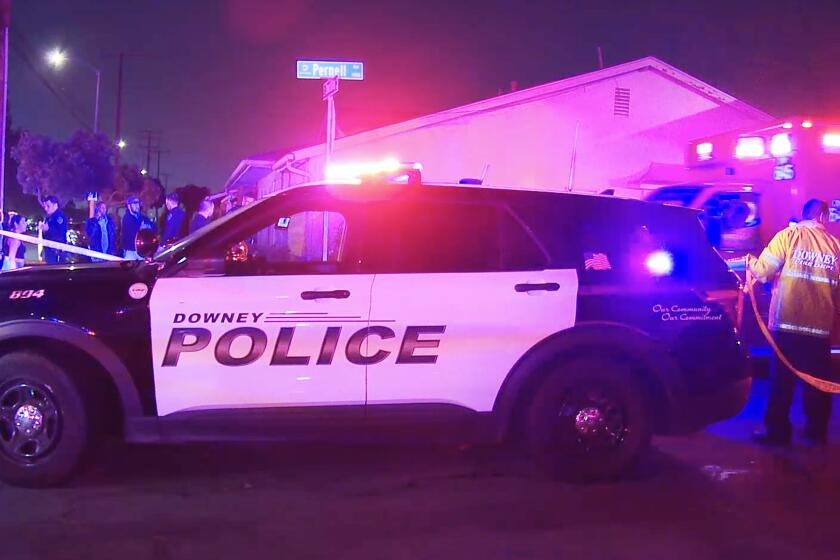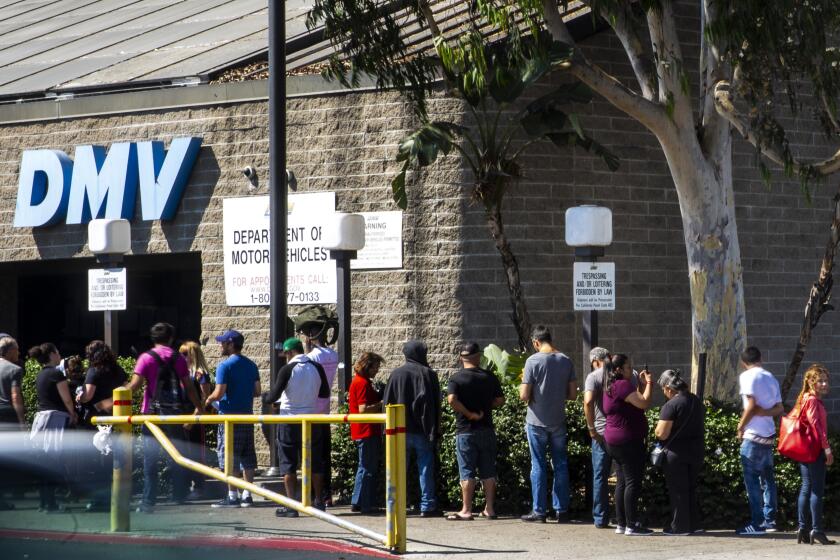New Latino health center to focus on chronic illnesses that made people vulnerable to COVID-19
Good morning, and welcome to the Essential California newsletter. It’s Friday, Oct. 15. I’m Metro reporter Alejandra Reyes-Velarde, filling in for Justin Ray from Long Beach.
Children’s Hospital Los Angeles and USC announced they’re launching a new center focused on researching chronic health disparities in Latino families using a $24.5-million grant from the National Institutes of Health. The Southern California Center for Chronic Health Disparities in Latino Families and Children was developed in part by USC professor Michael Goran after Congress appropriated funds specifically for more research on Latino health.
The center will support studies by USC, UC San Diego and Kaiser Permanente and includes a “community engagement core” that will rely on community stakeholders and promotoras to educate local Latinos about their health. I spoke with Dr. Goran about tackling these Latino health issues in a COVID-19 era that has impacted Latinos disproportionately.
Q: Why do Latinos suffer from higher rates of chronic illnesses like obesity and diabetes and how has that affected them during the pandemic?
A: There is an 80% higher rate of diabetes among Hispanics compared to non-Hispanic whites. We think early life nutrition is very important, but also the environment where people live, which can include a combination of factors like poor access to healthy food, poor access to resources, air pollution, even chemical contaminants in the environment we found contribute to this disparity.
One of the most common recurring risk factors, not so much for rates of infection, but the severity of the infection, is blood glucose levels. Individuals with higher blood glucose levels seem to have a more severe response to COVID-19 infection, and of course, higher blood glucose is what contributes to diabetes. Plus, COVID-19 has also been shown to trigger onset of diabetes after recovery. There’s a lot still to learn about all that, but clearly there are connections.
Q: The pandemic has proved how hard it is to bridge the gap between research and resources and Latinos who may not have health insurance or be connected to certain institutions. How do you plan to reach them in a “culturally sensitive” way?
There are 24 million people in Southern California’s 10 counties. Almost half are Latino. We have to take into account culture preferences, Latino dietary preferences. We can’t just throw a generic program at different segments of the population.
One of the interventions we are studying is a treatment for children with obesity using telehealth, working directly with parents to train them on how to deal with this problem. Once we show this works, the goal is to disseminate more broadly in the community.
The second project will develop an affordable grocery delivery meal program that aims to test the idea that a healthy meal program can be affordable even on SNAP [Supplemental Nutrition Assistance Program] dollars. [Kaiser Permanente] will develop a six-month healthy meal plan based on the SNAP project, which gives $650 a month for a family of four. We’re going to conduct focus groups before we launch into that food planning and grocery delivery program. We’ll talk to families, figure out what types of meal plans would work, what types of foods would be preferred or not preferred. This is specific to Latinos in Southern California, which is even more specific than for Latinos in general.
Q: The topic of obesity can be an uncomfortable subject to touch. How do you broach the subject with families effectively?
I think it’s really been an issue. Certainly talking about obesity and weight gain is difficult. But we can talk about poor nutrition and poor environment and how that collectively contributes to multiple outcomes that affect health, lifespan and quality of life.
Talking about diabetes, heart disease, fatty liver disease, can be addressed more effectively. Many Latino families deal with diabetes and see the end result of what that can do to health. Kids who live with parents and grandparents who have had limbs amputated because of diabetes or who have had a heart attack because of diabetes, those types of outcomes are unfortunate, but make the problem much more tangible and addressable.
And now, here’s what’s happening across California:
Note: Some of the sites we link to may limit the number of stories you can access without subscribing.
Another day, another pandemic milestone. COVID-19 has now killed 70,000 Californians, illustrating its deadly toll even as the latest coronavirus surge recedes. The loss is equivalent to emptying an entire midsize city, like Palo Alto, San Clemente or Lynwood. Los Angeles Times
City dwellers’ “mad rush” to the desert is changing Joshua Tree. The claustrophobia of pandemic life led Californians to flee the urban sprawl. Some transplants find serenity, others scorching rejection from the desert and its locals. Los Angeles Times
USC wants to say “sorry” to Japanese American Trojans they mistreated during World War II. After Executive Order 9066 was signed in 1942, USC refused to accept displaced students or hand in transcripts so they could study elsewhere. When some students tried to reenroll after the war, they were told they’d have to start over. Now, the university is asking the public for help in finding the families of 120 students who attended USC during the 1941-42 academic year, hoping to grant them posthumous honorary degrees. Los Angeles Times.
L.A. STORIES
Street vendors just want to work. The LACC Swap Meet is making it difficult. Street vendors who set up camp outside the Los Angeles City College Swap Meet say they’re being harassed and displaced by new owner Phillip Dane. The vendors showed up to City Hall on Tuesday morning in another battle against the criminalization of street vendors in Los Angeles. L.A. Taco
Yes, In-N-Out Burger has a band. And they’re playing at the House of Blues. On top of owing Southern California’s most iconic burger joint, Lynsi Snyder-Ellingson is also a rock star. Well, sort of. She and some of her colleagues will be performing at Anaheim’s House of Blues on Friday night as part of the Rock 2 Freedom event, which raises funds to fight drug addiction. San Gabriel Valley Tribune
Our daily news podcast
If you’re a fan of this newsletter, you’ll probably love our new daily podcast, “The Times,” hosted by columnist Gustavo Arellano, along with reporters from across our newsroom. Every weekday, it takes you beyond the headlines. Subscribe on Apple Podcasts and follow on Spotify.
POLITICS AND GOVERNMENT
Kern County judge blocks COVID-19 vaccine order for correctional officers. A vaccination mandate was set to go into effect Friday, but Judge Bernard Barmann issued a temporary restraining order that prevents the state from enforcing the Department of Public Health order. According to the Department of Corrections and Rehabilitation, 240 inmates and 39 prison employees have died from COVID-19. Sacramento Bee
San Francisco health advocates pressure Mayor London Breed to focus on a different pandemic. Anti-drug advocates are calling for the declaration of an emergency crisis for an increase of fentanyl overdoses, which has killed more than twice the number of people than COVID-19. San Francisco Chronicle.
CRIME AND COURTS
She was seen as “the cool mom.” Prosecutors say she’s a child abuser who pressured teens into sex acts. Shannon Marie O’Connor, a 47-year-old Bay Area woman is charged with 39 criminal counts relating to allegations that she threw wild parties for her 15-year-old son and other teens, giving them alcohol and then encouraging boys to sexually assault girls. The Washington Post
Robert Durst is sentenced to life in prison. After a five-month trial, a judge ordered Durst to spend the rest of his life in prison for killing Susan Berman, his longtime confidante, in 2000. The decades-long saga isn’t over, though. Prosecutors in New York are convening a grand jury to weigh charges against Durst for his first wife’s vanishing. Los Angeles Times.
Support our journalism
HEALTH AND THE ENVIRONMENT
After being tainted in O.C. oil spill, some birds take flight. Wildlife officials are still trying to save as many animals as they can after the Huntington Beach oil spill. As of Tuesday evening, they’ve collected 28 oil-covered birds from the shoreline. Six of those birds died or were euthanized. But two lucky birds, a ruddy duck and an eared grebe, were released Wednesday after going through rehabilitation at the edge of Huntington Harbour. Los Angeles Times.
CALIFORNIA CULTURE
“Hamilton” cast member says the production discriminated against them for their gender identity. Suni Reid, a Black actor who starred in Broadway’s “Hamilton” said they were harassed by the production and then fired in retaliation after they spoke up and requested gender-neutral restrooms. Reid, who is transgender and nonbinary, filed a complaint with the Equal Employment Opportunity Commission’s Los Angeles district office. The producers deny their allegations. The Hollywood Reporter
Free online games
Get our free daily crossword puzzle, sudoku, word search and arcade games in our new game center at latimes.com/games.
CALIFORNIA ALMANAC
Los Angeles: Sunny, 78. San Diego: Sunny, 71. San Francisco: Sunny, 69. San Jose: Sunny 75. Fresno: Sunny, 73. Sacramento: Sunny, 76.
AND FINALLY
Today’s California memory is from Mary Gill:
During World War II as a child growing up in the Westside Village/Palms area of L.A., our next-door neighbor invited me to go with him and his son to irrigate a walnut grove in the San Fernando Valley, an area I had never visited. We drove over the Sepulveda Pass in his Willys, through the tunnel, and as we descended to the Valley floor, it grew hotter and hotter. Waves of heat beat on me until we reached the shade of the walnut trees. I then luxuriated with my feet in the cooling irrigation water as it gushed from the standpipe.
If you have a memory or story about the Golden State, share it with us. (Please keep your story to 100 words.)
Please let us know what we can do to make this newsletter more useful to you. Send comments to essentialcalifornia@latimes.com.
Start your day right
Sign up for Essential California for news, features and recommendations from the L.A. Times and beyond in your inbox six days a week.
You may occasionally receive promotional content from the Los Angeles Times.



